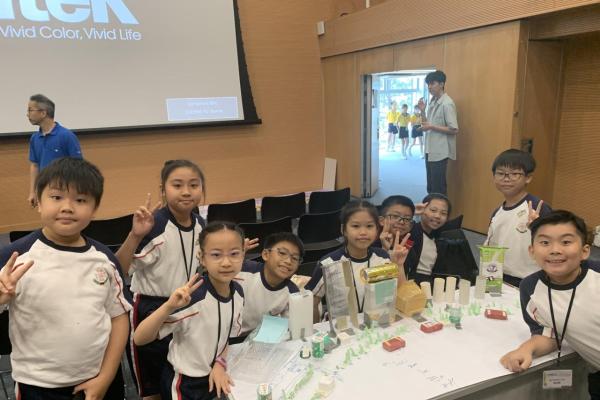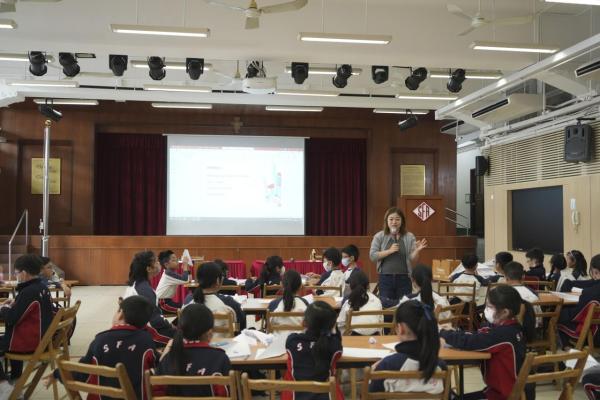- Home
- >
- Curriculum
- >
- Gifted Education
Gifted Education
Definitions of Gifted Education
An education program that recognizes individual differences. Embodied in this commitment is a responsibility to talented and gifted students to help them maximize their high potential (Davis & Rimm, 1998).
An appropriate education for gifted students in the recognition of individual differences and unique learning needs (VanTassel-Baska, 1992).
An education to establish learning opportunities that are accelerated, comprehensive, advanced, and diverse enough to meet the needs of gifted and potentially gifted students (U.S. Department of Education, 1993).
Curriculum opportunities provided for all learners that allow them to attain optimum levels of learning (Maker & Nielson, 1996).
Background
St. Francis of Assisi's English Primary School is a Diocesan Non-Profit Making Private Primary School. It was founded in 1955.
At present, our school has twenty-four classes. Most of our students are gifted and talented. In addition, in regard to the observation of our teachers and the recommendation of our parents, most of our students are in the high level of creative thinking, creative ability in music, physical education, science and so on. Therefore, the trend of our school development is to focus on Gifted Education so as to help our students develop their potential.
Rationale
Our School is committed to an education program that recognizes individual students’ differences. Embodied in this commitment is a responsibility to gifted and talented students and other students to help them maximize their potentials. Based on the belief that everyone has an important role to be enhanced if we provide him/her with opportunities, resources and encouragement and aspire him/her to the highest level of talent development, our School has the aim to provide gifted education program for all students in school, i.e. our School-wide Gifted Education Program.
The teaching materials and activities designed by teachers are all based on the three elements of gifted education in Hong Kong. They are:
A. Higher Order Thinking
1. Teaching/Learning Content
- Critical thinking skills
- Problem solving skills
- Higher level thinking skills such as knowledge, comprehension, application, analysis, synthesis, and evaluation in Bloom’s taxonomy.
2. Approach/Strategy
- Incorporate thinking skills in all Key Learning Areas across all class levels
B. Creativity
1. Teaching/Learning Content
- Increase creativity consciousness and attain accurate attitude
- Understand the concept of creative thinking
- Strengthen creative abilities such as fluency, flexibility, originality, elaboration, sensitivity, visualization, analogical thinking, analysis, synthesis, evaluation etc.
- Teach creative thinking techniques and creative problem solving strategies
2. Approach/Strategy
- Develop students' creativity through the general curriculum in all Key Learning Areas
- Create a learning/classroom climate conducive to creativity
C. Personal and Social Competence
1. Teaching/Learning Content
- Self understanding
- Self expectations
- Expectations of others
- Peer relationship
- Coping with stress
- Study habits
- Social skills
- Leadership ability
- Career exploration, etc.
2. Approach/Strategy
- Immerse the skill in every subject area
- Use cooperative learning techniques in the regular lessons
Strategy
The three elements of Gifted Education in Hong Kong are High Order Thinking, Creativity and Personal and Social Skills. The curriculums, teaching materials and activities designed by our teachers in gifted education in school are thus all based on the above three elements.
In order to promote and develop gifted education in school, a Gifted Education Committee has been formed. Pull out Programmes, and Curriculum Compacting are the main teaching models in our school.
Pull-out Programme is a programme that the gifted and talented students are pulled out of their regular classes once per week for one to two hours per session to participate in special enrichment activities, guided usually by gifted and talented teachers. Teachers conduct special activities for the students so as to enhance their learning abilities and develop their potential.
Curriculum Compacting aims to let gifted students learn more effectively and efficiently in regular lesson. Students are given more challenging task instead of regular classwork to complete during the lessons and they would present their learning products to other students in their class.
Criteria of selecting Gifted Students
- assessed by experts (IQ Test above 130)
- selected according to their academic achievement
- recommended by teachers and assessed by committee board
- assessed by school-based assessment on creativity
Pull-out Programme
Compulsory Courses
1. Introduction to Gifted Education
2. Affective Education
Elective Courses
1. Adventure Activities
2. Young Critical Thinkers
3. Machines and Mechanisms
4. Little English Writers and Creators
5. 小小演講家
6. Gifted Education Workshop
Major courses (for P4-P6)
1. Chinese
2. English
3. Mathematics
4. Science
5. Visual Arts
6. Music
7. Physical Education
Off-site Support
Education Bureau
Gifted Education Fund: Off-school Advanced Learning Programmes
https://www.edb.gov.hk/en/curriculum-development/curriculum-area/gifted/ge_fund/gef/osalp.html
2024/25 Web-based Learning Courses for Gifted/More Able Students (jointly administered by the EDB and the HKAGE)
The Hong Kong Academy for Gifted Education
The Chinese University of Hong Kong
https://www.fed.cuhk.edu.hk/pgt/Home/index_e.php
The Hong Kong University of Science and Technology
https://cdgt.hkust.edu.hk/home
The University of Hong Kong








